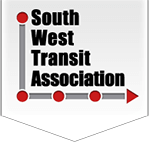South West Transit Association
Community Mobility Agenda
Community Mobility - River Room
Monday July 28th
Community Transit Insurance Program for SWTA
9:30 - 10:30 AM
Presenters: Eddie Thomas and David Cooper, INSURICA
INSURICA will present and discuss a new commercial insurance program for public transit providers. This has been years in the making and now is here.
FTA TRaMs
10:45 AM - 12:00 PM
Presenters: Invited: Gail Lyssy and Lauren Andrews, FTA
Learn about new changes and requirements for working in FTA’s grant management program, TRaMS, directly from Region VI staff.
Strategies for Reducing ADA-Related Lawsuits & Complaints
1:30 - 5:00 PM
Presenter: Jess Segovia, ADA Compliance Consultant & Trainer - ADA Guru
Join Jess Segovia, ADA Guru, as he reviews a number of strategies for reducing ADA-related lawsuits and complaints filed by riders with disabilities. In addition, you will learn how to enhance their ADA Compliance practices in order to be in the best position possible should your transit agency need to defend itself from an FTA complaint, lawsuit, etc. Discussions will include effectively handling pass-ups, the importance of operating policies, enhancing your training program, service oversight practices, rider education efforts, etc.
Speaker Bio: Jess Segovia, ADA Guru, has been creating fully accessible public transportation services and training programs for over 26 years. ADA Guru specializes in the operating requirements of the ADA and has provided comprehensive training and consulting services to over 1,000 transit agencies nationwide. Visit www.ADAguru.co to learn more.
Tuesday July 29th
Budgeting 101 for Non-Financial Managers
9:30 - 10:30 AM
Presenter: James Oliver, General Manager - Galveston Island Transit
Financial management is always complex work at any size agency. This session is meant for those stepping into leadership roles that include fiscal responsibilities. We’ll discuss budgeting, forecasting revenues & expenses, basic accounting concepts and other skills needed to become a diligent financial manager.
Metrics that Make the Case for Frontline Workforce Development Initiatives
10:45 - 11:45 AM
Presenters:
Maurice Beard, Senior Workforce Development Advisor, Transit Workforce Center
Michaela Boneva, Research Associate, Transit Workforce Center
As transit agencies examine their resources and consider where they should be directed, the ability to establish a program’s effectiveness often becomes critical. One of the key elements in establishing this return on investment is gathering, tracking, and showcasing metrics that help make the case for particular programs. Using mentorship programs as a leading example, presenters from the Federal Transit Administration’s Transit Workforce Center will discuss how transit agencies can systematically collect and analyze data that identifies areas for improvement and showcases quantifiable benefits, with a particular impact on workers new to the workforce. Metrics tracked have included retention rates, absenteeism, accident rates, grievances, and customer service. In addition to examining how metrics have been used to make the case for mentorship, presenters will also discuss other workforce programs that present opportunities to gather data and showcase the impact those programs have had for transit agencies of all sizes.
Attendees will gain valuable insights into the following key areas:
- Mentorship programs, including how they are designed, how they operate, and their role in improving performance, fostering a positive work culture, and supporting next generation of workers as they enter the transit workforce, using specific examples from existing programs in the industry.
- Tracking mentorship metrics, reviewing essential metrics, measurement methods, and ways to effectively demonstrate and highlight outcomes in areas such as retention rates, safety performance, attendance, and employee satisfaction.
- Strategies for collecting, analyzing, and showcasing data for other workforce initiatives.
- Practical tools and knowledge that will support session participants in establishing, refining, and assessing workforce development programs, while tracking metrics in order to gain organizational buy-in, secure funding, and make continuous program improvements.
